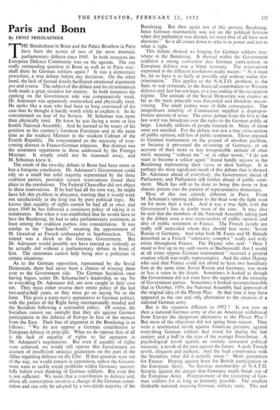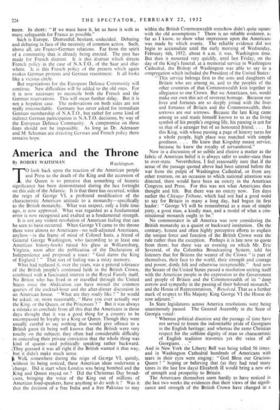Paris and Bonn
By ERNST FRIEDLAENDER
THE Bundeshaus in Bonn and the Palais Bourbon in Paris have been the scenes of two of the most dramatic parliamentary debates since 1945. In both instances the European Defence Community was on the agenda. The one really outstanding question in Bonn as well as in Paris was: shall there be German soldiers again ? It was a democratic procedure, a true debate before any decisions. On the other hand, the lack of factual details facilitated emotional arguments pro and contra. The subject of the debate and its circumstances both made a great occasion for oratory. In both instances the opening on the Government side was comparatively weak. Dr. Adenauer was apparently overworked and physically tired. He spoke like a man who had been so long convinced of his case that he thought it hardly worth while to explain it. So he concentrated on fear of the Soviets. M. Schuman was more than physically tired. He knew he vas facing a more or less hostile National Assembly. And he seemed to be weary of his position as his country's foremost European and at the same time as the weakest Minister in the weakest Cabinet of the Fourth Republic. He concentrated on the necessity of over- coming distrust in Franco-German relations. But distrust was the sentiment uppermost in those addressed by the Foreign Minister. It simply could not be reasoned away, and M. Schuman knew it.
The result of the two-day debate in Bonn had been more or less a foregone conclusion. Dr. Adenauer's Government could rely on a small but solid majority represented by the three coalition parties, provided certain reservations found their place in the resolutions. The Federal Chancellor did not object to these reservations. If he had had all his own way, he might have left this problem in abeyance, trusting that it would work out satisfactorily in the long run by pure political logic. He knows that equality of rights cannot be had all at once, and since 1949 he has followed a consistent policy of taking it in instalments. But when it was established that he would have to face the Bundestag, he had to take parliamentary sentiment, at least among the coalition parties, into consideration. It was similar to the " Saar-bomb," meaning the appointment of M. Grandval as French ambassador in Saarbruecken. This indeed was a shock to the German Government. But Dr. Adenauer would possibly not have reacted as violently as he actually did without a parliamentary debate in front of him. The statesman cannot help being also a politician in certain situations.
As to the German opposition, represented by the Social Democrats, there had never been a chance of winning them over to the Government side. The German Socialists once having begun, under Dr. Schumacher's leadership, to say No to everything Dr. Adenauer did, are now caught in their own net. They must either reverse their entire policy of the last two-and-a-half years, or they must go on saying No to the limit. This gives a topsy-turvy appearance to German politics, with the parties of the Right being internationally minded and the Socialists following a nationalist policy. Of course, the Socialists cannot say outright that they are against German participation in the defence of Europe in face of the menace from the East. Their line of argument in the Bundestag is as follows: " We do not oppose a German contribution to European defence in principle. What we do oppose first of all is the lack of equality of rights so far apparent in Dr. Adenauer's negotiations. But even if equality of rights were achieved, we would still oppose this Government on account of insufficient strategic guarantees on the part of the Allies regarding defence on the Elbe. If that question were out of the way, we would remain in opposition, unless the Govern- ment were to tackle social problems within Germany success- fully before even thinking of German soldiers. But even this is not sufficient. We insist that a contribution to defence and, above all, conscription involves a change of the German consti- tution and can only be adopted by a two-thirds majority of the Bundestag. But then again not of this present Bundestag. Since German rearmament was not on the political horizon when this parliament was elected, we must first of all have new elections." So it all comes down to who is in power and not to what is right.
This debate showed no longing for German soldiers any- where in the Bundestag. It showed within the Government coalition a strong conviction that German participation in European defence was a bitter necessity. The reservations expressed in the different resolutions really meant: " As it must be, let us have it as fairly as possible and without undue dis- crimination." This applies to the N.A.T.O. problem, to the Saar, to war criminals, to the financial contribution to Western defence and, last but not least, to a true ending of the occupation regime. The attitude of the Social Democrats was evasive as far as the main principle was concerned and therefore uncon- vincing. The small parties were of little consequence. The insignificant minority of Communists supplied a dispropor- tionate amount of noise. The entire debate from the first to the last word was broadcast over the radio to the German public at large. Literally millions of people listened in. Many of these, were not satisfied. For the debate was not a true cross-section of public opinion, still less of public sentiment. Those opposed to German rearmament on the ground of absolute pacifism, or because it prevented the re-uniting of Germany, or on account of their more or less irresponsible attitude of ohne mich, meaning " without me " or, in other words, " I do not want to become a soldier again " found hardly anyone in the Bundestag representing their views or their feelings. It is perhaps the most significant result of this debate that it showed Dr. Adenauer ahead of everybody, the Government ahead of Parliament, and Parliament still farther ahead of public senti- ment. Much has still to be done to bring this more or less chaotic picture into the pattern of representative democracy.
Most of this was entirely different in Paris. From M. Schuman's opening address to the final vote the fight went on for more than a week. And it was a true fight, with the Government's fate in doubt most of the time. It may also be said that the members of the National Assembly taking part in the debate were a true cross-section of public opinion and also of public sentiment in France. The French people are really still undecided whom they should fear more : Soviet Russia or Germany. And what both M. Faure and M. Bidault described as a French " inferiority complex " really and truly exists throughout France. The Deputy who said : " Here I stand to live up to my oath sworn at Buchenwald, that I would at all times oppose German rearmament " received a general ovation which was really representative. And the other Deputy who said that France could not afford to have two hereditary foes at the same time, Soviet Russia and Germany, was more or less a voice in the desert. Sometimes it looked as though the Government did not even have the support of the minority of Government parties. Sometimes it looked incomprehensible that in October, 1950, the National Assembly had approved of the original idea of the Pleven Plan. At that time it may have appeared as the one and only alternative to the creation of a national German army.
But is the situation different in 1952 ? Is not now as then a national German army or else an American withdrawal from Europe the dangerous alternative to the Pleven Plan ? But most of the objections did not spring from reason. They were a sentimental revolt against American pressure, against everything German soldiers had stood for during the last century and a half in the eyes of the average Frenchman. A psychological revolt against an entirely unwanted political necessity, a revolt of the past against the future. A truly French revolt, eloquent and pathetic. And the final compromise with the Socialists, what did it actually mean ? More guarantees for France. Hoping against hope for British participation in the European Army. No German membership of N.A.T.O. Security against the danger that Germany might break out of the European Army. Postponement of the recruiting of Ger- man soldiers for as long as humanly possible. The smallest thinkable national, meaning German, military units. This and more. In short: " If we must have it, let us have it with as many safeguards for France as possible." Such is Europe. Distrustful, hesitant, undecided. Debating and debating in face of the necessity of common action. Such, above all, are Franco:German relations. Far from the spirit of a community that is already being erected. The past has made for French distrust. It is this distrust which directs French policy in the case of N.A.T.O., of the Saar and else- where. It is this French policy of the present which again evokes German protests and German resentment; It all looks like a vicious circle.
But negotiations for the European Defence Community will continue. New difficulties will be added to the old ones. For it is now necessary to reconcile both the French and the German reservations. This will mean further delay. But it is not a hopeless case. The reservations on both sides are not really irreconcilable. Germany has never asked for immediate German membership of N.A.T.O., but rathet for some kind of indirect German participation in N.A.T.O. decisions, by way of the European Defence Community. A compromise on these .lines should .not be impossible. As long as Dr. Adenauer and M. Schuman are directing German and French policy there remains hope.



































 Previous page
Previous page